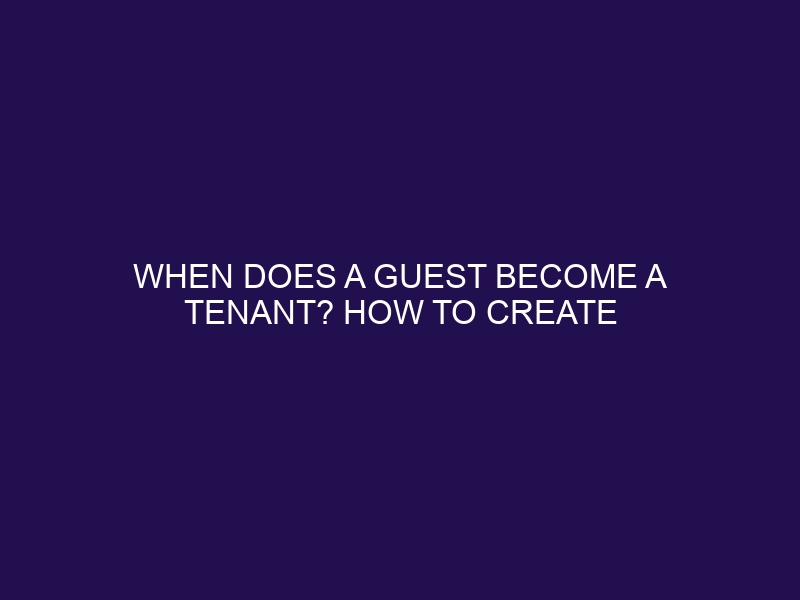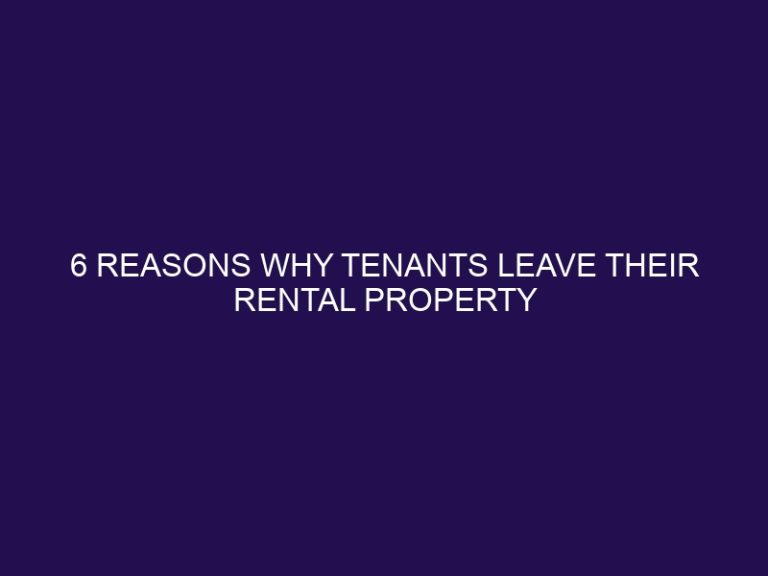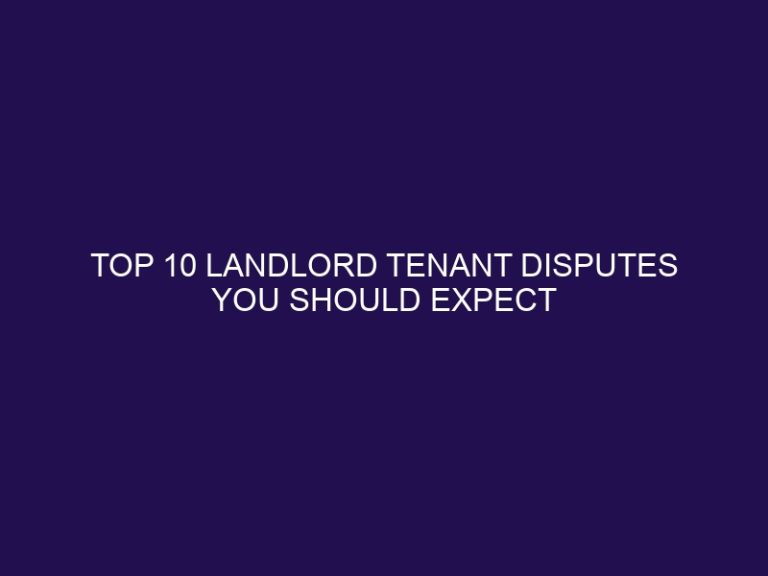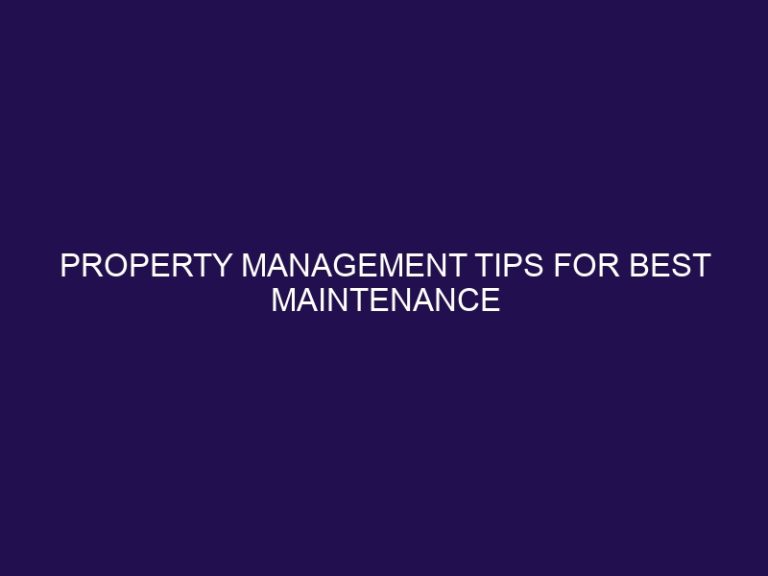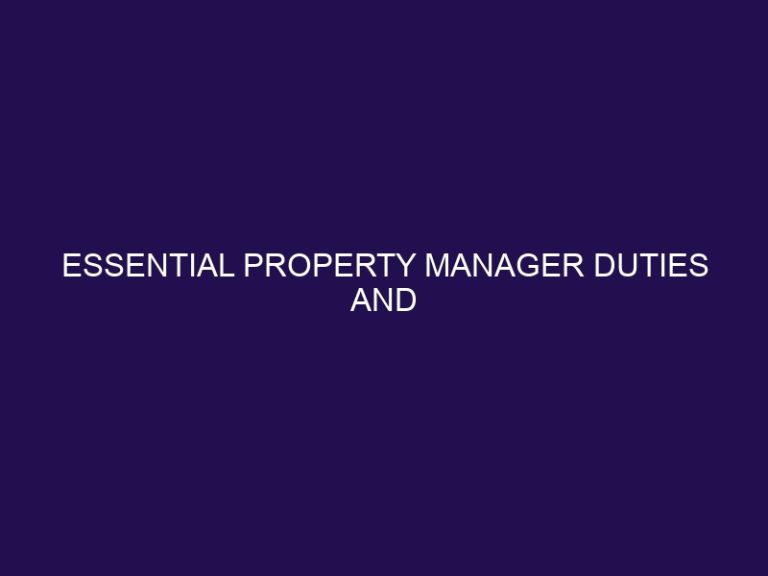When Does a Guest Become a Tenant? How to Create and Enforce Your Guest Policy
Guest policies are an important aspect of property management, whether it be in residential buildings or short-term rental properties. Understanding the distinction between a guest and a tenant is essential to maintain order and ensure the safety and security of the property. It is crucial to create and enforce a guest policy to clarify expectations, protect the rights of tenants, and maintain a peaceful living environment. By defining the term “guest,” establishing duration limits, outlining responsibilities, and addressing additional guidelines, property owners can effectively create an efficient guest policy. Enforcing the policy involves clear communication, regular reminders, prompt handling of violations, and seeking legal advice when necessary. By following these guidelines, property owners can successfully create and enforce their guest policy while maintaining a harmonious living environment.
Understanding the Distinction: Guest vs. Tenant
It is crucial to understand the distinction between a guest and a tenant for creating and enforcing a guest policy.
- When it comes to the duration of stay, a guest usually stays for a short period as a visitor, while a tenant has a lease or rental agreement and stays for a more extended period.
- Intention and consent play a role in differentiating a guest and a tenant. A guest is invited and permitted to stay temporarily by the occupant, whereas a tenant intends to establish a long-term residence and has the legal right to occupy the property.
- Guests do not have the same legal rights or responsibilities as tenants. Tenants have certain rights and obligations, including paying rent and following rules outlined in the lease agreement.
- Having a clear guest policy is essential, which should include information about the maximum allowed stay, notification requirements, and any conditions for guests to be added to the lease agreement if they plan to stay longer.
By understanding the distinction between a guest and a tenant, landlords can create a comprehensive guest policy that protects their property while also respecting the rights of tenants. It is recommended to consult with legal professionals or local regulations to ensure compliance with applicable laws.
What Defines a Guest?
A guest is someone who is invited to stay at a property temporarily. What Defines a Guest? They do not have a permanent or legal right to occupy the space. The distinction between a guest and a tenant is important because tenants have legal rights and obligations, while guests do not. To define a guest, it is necessary to consider factors such as the duration of their stay, their relationship with the resident, and the nature of their occupancy. A guest becomes a tenant when they exceed the limits set for their stay or when they start paying rent. It is crucial to establish and communicate a clear guest policy to avoid misunderstandings and protect the rights of tenants.
When Does a Guest Cross the Line and Become a Tenant?
When Does a Guest Cross the Line and Become a Tenant?
A guest becomes a tenant when they start to occupy and use the property as their primary residence, and not just temporarily. When does a guest cross the line and become a tenant? This can happen when a guest starts paying rent, signing a lease, or staying for an extended period. Other indicators, which determine when a guest becomes a tenant, include receiving mail at the address, having personal belongings stored in the property, and having exclusive access to certain areas. It’s important for landlords to carefully monitor guest behavior and establish clear guidelines to prevent guests from becoming tenants without proper consent. Ensuring effective communication, enforcing guest duration limits, and handling violations promptly can help maintain a clear distinction between guests and tenants.
Importance of Creating a Guest Policy
Setting clear guidelines for guest policies is crucial to maintaining a harmonious living environment. In this discussion, we will delve into the importance of creating a guest policy and explore its various facets. From clarifying expectations and protecting the rights of tenants, to ensuring safety and security within the premises, we will navigate through the essential elements that contribute to an effective guest policy. So, let’s uncover the significance of establishing a well-defined guest policy to foster a peaceful and secure living space.
Clarifying Expectations
When creating a guest policy, it is essential to clarify expectations to avoid any confusion or misunderstandings. It is crucial to clearly define what constitutes a guest and differentiate them from tenants. Additionally, it is important to specify the duration limits for guests and outline their responsibilities during their stay. Furthermore, addressing amenities and facilities access is necessary to ensure that guests are aware of what they can and cannot use. By clarifying expectations, you can promote a harmonious living environment for all residents. A noteworthy detail is that a well-defined guest policy can also help prevent potential legal issues down the line.
Protecting the Rights of Tenants
Protecting the rights of tenants is of utmost importance when formulating a guest policy. By clearly defining the distinction between guests and tenants, you can establish expectations and ensure the safety and security of all residents. Setting guest duration limits and outlining their responsibilities helps maintain a harmonious living environment. It is crucial to specify access to amenities and facilities to prevent any potential conflicts. To effectively enforce the policy, it is essential to communicate it clearly, consistently remind and reinforce it, and promptly address any violations. If necessary, seeking legal advice can offer additional protection to tenants. Ultimately, a well-crafted guest policy safeguards the rights and interests of all residents in a fair and equitable manner.
Ensuring Safety and Security
Ensuring safety and security is of utmost importance when devising and enforcing a guest policy in a rental property. This encompasses implementing various measures to safeguard the rights of tenants and maintain a secure environment for everyone. The guest policy should effectively communicate expectations, including the registration requirement for all guests and the limitation of their access to specific amenities or facilities. It is essential to regularly remind and reinforce the policy to ensure compliance. Swift and consistent actions must be taken in the face of any violations to preserve the safety and security of all residents. In more intricate scenarios, seeking legal counsel may be imperative to safeguard the interests of both tenants and property owners.
How to Create an Effective Guest Policy
Creating an effective guest policy is crucial when it comes to managing your property and ensuring a positive experience for both guests and tenants. In this section, we’ll explore how to craft a guest policy that strikes the right balance between welcoming guests and maintaining the integrity of your property. From defining what constitutes a guest to establishing clear duration limits, outlining responsibilities, and addressing additional guidelines – we’ll cover it all to help you develop a comprehensive and fair guest policy. So, let’s dive in and create a policy that works for you!
Define the Term “Guest”
A clear definition of the term “guest” is crucial when formulating a guest policy. To define a guest, it refers to an individual who is granted temporary access to a property for the purpose of visiting, socializing, or temporarily residing with the tenant or owner. It is of utmost importance to establish explicit guidelines that outline the duration of a guest’s stay and their obligations while present on the premises. By doing so, any potential confusion or disputes caused by guests overstaying their welcome or engaging in disruptive activities can be avoided. By incorporating a precise definition of the term “guest” in your policy, you can effectively manage expectations and ensure a harmonious living environment for all residents.
Establish Guest Duration Limits
Establishing guest duration limits is an important aspect of creating a guest policy in order to maintain control and harmony within your property. Here are the steps to follow:
- Evaluate the needs and dynamics of your property.
- Consider the impact of long-term guests on the availability of your amenities.
- Determine a reasonable timeframe for guest stays, taking into account local regulations.
- Clearly communicate the duration limits to all tenants and guests.
- Monitor guest stays and enforce the limits consistently.
Pro-tip: Regularly review and update your guest duration limits to ensure they align with your property’s needs and regulations.
Outline Guest Responsibilities
Creating an effective guest policy involves outlining the responsibilities that guests must adhere to. Here are the key steps to consider:
-
Clearly outline guest responsibilities, such as respecting quiet hours or maintaining cleanliness.
-
Establish duration limits for guest stays to avoid potential problems with long-term occupancy.
-
Specify specific responsibilities, such as ensuring guests do not disturb other tenants or damage property.
-
Indicate the amenities or facilities guests are allowed to use during their stay.
-
Address any additional guidelines or restrictions, such as restrictions on overnight guests or the number of guests allowed at one time.
By outlining guest responsibilities in your policy, you can ensure a harmonious living environment for all tenants and guests.
Specify Amenities and Facilities Access
When creating a guest policy, it is important to clearly specify the amenities and facilities that guests have access to. This helps to ensure that both guests and tenants are aware of the boundaries and can use the shared spaces appropriately.
- Specify which amenities guests are allowed to use, such as the gym, pool, or common areas.
- Outline any restrictions on the use of certain facilities, such as limited hours or reservations required.
- Clearly communicate any additional guidelines, such as noise restrictions or rules for using shared equipment.
- Include any fees or charges that may apply for guests to use specific amenities or facilities.
Address Additional Guidelines or Restrictions
Addressing additional guidelines or restrictions is essential to maintain order and ensure a positive experience for both tenants and guests.
By clearly outlining these additional guidelines or restrictions in a guest policy, property owners can set expectations and prevent conflicts or misunderstandings.
To address additional guidelines or restrictions in a guest policy, it is helpful to define the acceptable use of shared facilities, specify quiet hours, and outline any limitations on the number or frequency of guests.
Regularly reviewing and reinforcing these guidelines can contribute to the creation of a harmonious living environment for all residents.
Enforcing Your Guest Policy
Enforcing your guest policy is crucial to maintain order and harmony within your property. In this section, we will discover effective strategies to ensure compliance with your guest policy. We’ll explore how clear communication, regular reminders, and prompt handling of violations play a pivotal role in maintaining a respectful environment. We’ll touch upon the importance of seeking legal advice if necessary to safeguard your property and protect the rights of both guests and tenants. Get ready to establish a strong foundation for a well-enforced guest policy.
Communicate the Policy Clearly
Effectively communicating your guest policy is essential for maintaining a harmonious living environment. Here are some essential steps to follow:
- Make sure to clearly communicate the term “guest” to avoid any confusion or misinterpretation.
- Set clear duration limits for guests to ensure that they do not overstay their welcome.
- Clearly outline the responsibilities that guests must adhere to, such as following community rules and respecting the rights of other tenants.
- Specify which amenities and facilities guests have access to, ensuring that they are aware of any restrictions.
- Additionally, address any extra guidelines or restrictions that need to be communicated to guests.
By effectively communicating your guest policy, you can cultivate a positive and respectful living environment for all tenants.
In 2017, a university housing community implemented a comprehensive guest policy, effectively communicating the expectations and rules to all residents. As a result, incidents of unauthorized guests and disruptions decreased significantly, creating a more peaceful and enjoyable living experience for everyone.
Regularly Remind and Reinforce the Policy
To maintain compliance with your guest policy, it is crucial to regularly remind and reinforce the policy to all residents and guests. Here are a few steps to accomplish this:
1. Effective Communication: During the onboarding process, clearly communicate the guest policy and provide written copies for residents to easily reference.
2. Ongoing Reminders: Send periodic reminders to residents through email, newsletters, or notices in common areas. Highlight the significance of adhering to the policy and the consequences of non-compliance.
3. Training Sessions: Conduct regular training sessions or workshops to educate residents about the policy and address any questions or concerns they may have.
4. Prominent Signage: Display signs in strategic locations like entrances, elevators, and community spaces, to remind residents and guests about the policy.
By consistently reminding and reinforcing the guest policy, you can ensure that residents remain aware of the rules and foster a culture of compliance within the community.
Handle Violations Promptly and Consistently
Handling violations promptly and consistently is essential when enforcing a guest policy. To effectively address violations, follow these steps:
- Keep a detailed record of each violation, including dates, times, and specific details.
- Clearly communicate the consequences for violating the guest policy, such as fines or lease termination.
- Take immediate action to address violations, preventing further disruptions or damage.
- Treat every violation with the same level of seriousness and enforce the policy uniformly.
- Regularly remind tenants about the guest policy and educate them about the consequences of violating it.
- Offer guidance to tenants on how they can report potential policy violations or disturbances.
- Periodically review and update the guest policy to address any potential gaps or changing circumstances.
In a recent case, a property manager had to handle a repeat violator of their guest policy. Despite multiple warnings, the tenant persisted in housing unauthorized long-term guests. By promptly and consistently taking action, the property manager implemented fines and ultimately terminated the lease, ensuring a respectful and safe environment for all tenants.
Seek Legal Advice if Necessary
If you’re facing legal complications regarding your guest policy, it’s essential to seek legal advice promptly. Consulting with a legal professional can help you navigate the complexities of landlord-tenant law and ensure that you are acting within the bounds of the law. They can provide guidance on how to resolve disputes, handle violations, and enforce your guest policy effectively. Remember, seeking legal advice if necessary can protect your rights as a landlord and help you maintain a fair and lawful living environment for all tenants.
Frequently Asked Questions
When does a guest become a tenant?
A guest becomes a tenant when they establish residency and start living in the rental property on a fixed and ongoing basis, typically determined by state laws and rental agreements.
What is the “bright line rule” in Washington State?
Unlike California, Washington State does not have a “bright line rule” that automatically converts a guest into a tenant after a specific period of time. Landlords in Washington State must establish in their lease agreement how long they are willing to accommodate a tenant’s guest.
What are the legal responsibilities of a tenant compared to a guest?
Tenants have legal responsibilities outlined in the lease agreement, such as paying rent and maintaining the property. Guests, on the other hand, are not listed on the lease and do not have the same legal obligations as tenants.
Can a guest claim tenant’s rights after a certain period of time?
In most places, a guest can claim tenant’s rights after residing in the property for at least 29 days. However, the transition from guest to tenant and the associated legal rights may vary depending on the specific rental laws of the state or jurisdiction.
What are the potential consequences for not differentiating between guests and tenants?
Failing to differentiate between guests and tenants can lead to various issues including insurance coverage complications, difficulties in handling disputes, and potential legal actions or insurance claims. It is important for property owners to clearly define and enforce their guest policy to avoid such consequences.
How can property owners create and enforce a guest policy?
Property owners can create and enforce a guest policy by including it in the lease agreement. This policy should clearly outline the duration and limitations for accommodating guests and specify the point at which a guest may be considered a tenant. By setting these guidelines, property owners can effectively manage the distinction between guests and tenants and ensure compliance with rental laws and regulations.

